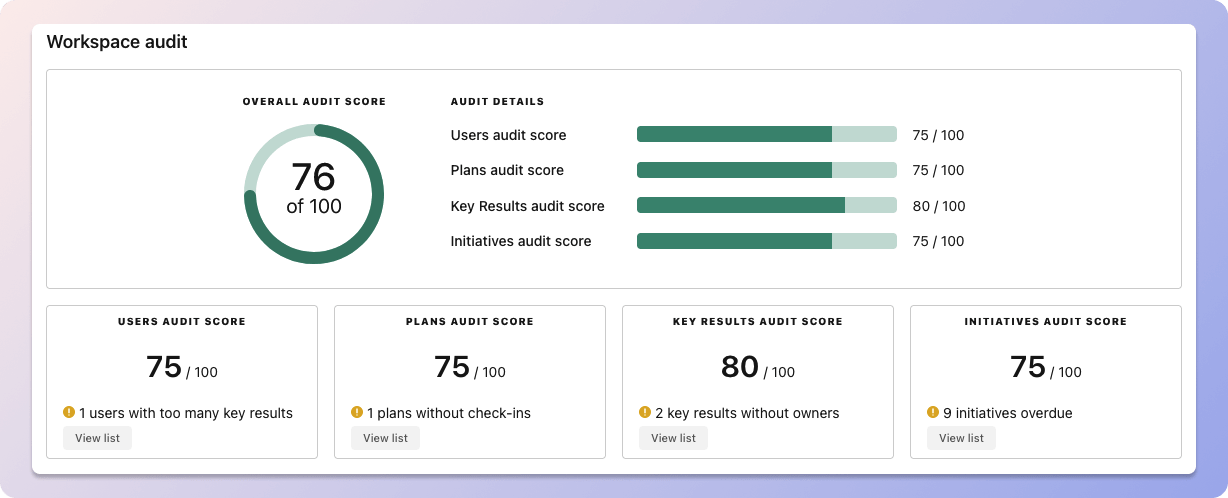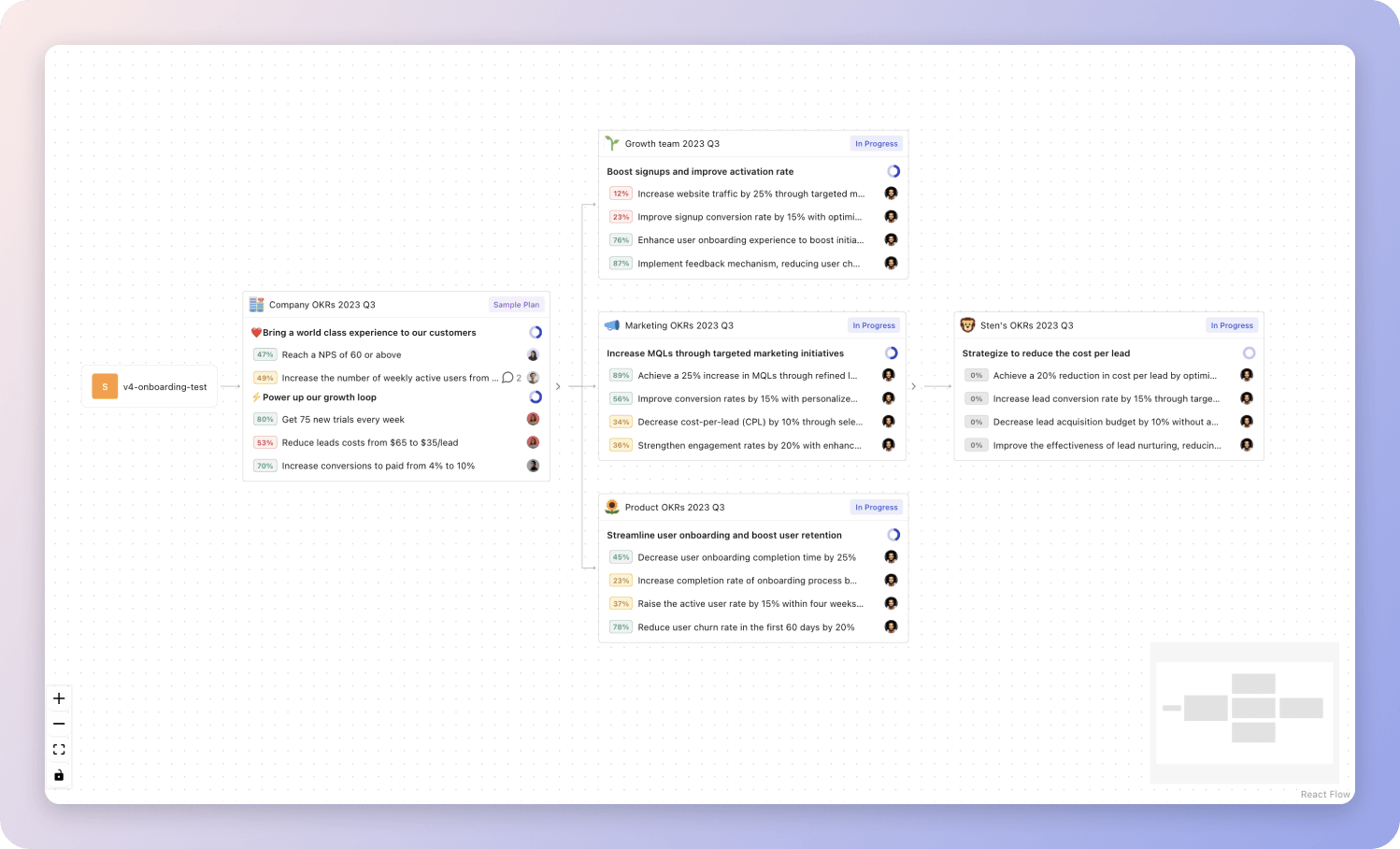1 OKR examples for Knowledge Management Team
What are Knowledge Management Team OKRs?
The OKR acronym stands for Objectives and Key Results. It's a goal-setting framework that was introduced at Intel by Andy Grove in the 70s, and it became popular after John Doerr introduced it to Google in the 90s. OKRs helps teams has a shared language to set ambitious goals and track progress towards them.
OKRs are quickly gaining popularity as a goal-setting framework. But, it's not always easy to know how to write your goals, especially if it's your first time using OKRs.
To aid you in setting your goals, we have compiled a collection of OKR examples customized for Knowledge Management Team. Take a look at the templates below for inspiration and guidance.
If you want to learn more about the framework, you can read more about the OKR meaning online.
Best practices for managing your Knowledge Management Team OKRs
Generally speaking, your objectives should be ambitious yet achievable, and your key results should be measurable and time-bound (using the SMART framework can be helpful). It is also recommended to list strategic initiatives under your key results, as it'll help you avoid the common mistake of listing projects in your KRs.
Here are a couple of best practices extracted from our OKR implementation guide 👇
Tip #1: Limit the number of key results
Having too many OKRs is the #1 mistake that teams make when adopting the framework. The problem with tracking too many competing goals is that it will be hard for your team to know what really matters.
We recommend having 3-4 objectives, and 3-4 key results per objective. A platform like Tability can run audits on your data to help you identify the plans that have too many goals.
 Tability's audit dashboard will highlight opportunities to improve OKRs
Tability's audit dashboard will highlight opportunities to improve OKRsTip #2: Commit to the weekly check-ins
Setting good goals can be challenging, but without regular check-ins, your team will struggle to make progress. We recommend that you track your OKRs weekly to get the full benefits from the framework.
Being able to see trends for your key results will also keep yourself honest.
 Tability's check-ins will save you hours and increase transparency
Tability's check-ins will save you hours and increase transparencyTip #3: No more than 2 yellow statuses in a row
Yes, this is another tip for goal-tracking instead of goal-setting (but you'll get plenty of OKR examples below). But, once you have your goals defined, it will be your ability to keep the right sense of urgency that will make the difference.
As a rule of thumb, it's best to avoid having more than 2 yellow/at risk statuses in a row.
Make a call on the 3rd update. You should be either back on track, or off track. This sounds harsh but it's the best way to signal risks early enough to fix things.
Building your own Knowledge Management Team OKRs with AI
While we have some examples below, it's likely that you'll have specific scenarios that aren't covered here. There are 2 options available to you.
- Use our free OKRs generator
- Use Tability, a complete platform to set and track OKRs and initiatives
- including a GPT-4 powered goal generator
Best way to track your Knowledge Management Team OKRs
Your quarterly OKRs should be tracked weekly in order to get all the benefits of the OKRs framework. Reviewing progress periodically has several advantages:
- It brings the goals back to the top of the mind
- It will highlight poorly set OKRs
- It will surface execution risks
- It improves transparency and accountability
Spreadsheets are enough to get started. Then, once you need to scale you can use a proper OKR platform to make things easier.
 Tability's Strategy Map makes it easy to see all your org's OKRs
Tability's Strategy Map makes it easy to see all your org's OKRsIf you're not yet set on a tool, you can check out the 5 best OKR tracking templates guide to find the best way to monitor progress during the quarter.
Knowledge Management Team OKRs templates
We've covered most of the things that you need to know about setting good OKRs and tracking them effectively. It's now time to give you a series of templates that you can use for inspiration!
We've added many examples of Knowledge Management Team Objectives and Key Results, but we did not stop there. Understanding the difference between OKRs and projects is important, so we also added examples of strategic initiatives that relate to the OKRs.
Hope you'll find this helpful!
OKRs to improve documentation utilization
Improve documentation utilization
Increase average time spent on reading documentation by 15 minutes per week
Create a user-friendly index for easy navigation within the documentation
Incorporate interactive elements such as quizzes to engage readers in the documentation
Use visual aids like diagrams and infographics to enhance comprehension of the content
Provide concise and relevant examples throughout the documentation to clarify concepts
Utilize documentation for problem resolution in at least 80% of complex cases
Ensure that comprehensive documentation is easily accessible and organized for reference
Regularly update and maintain documentation to reflect the latest information and procedures
Train employees on effectively utilizing documentation for problem resolution
Implement a system to track and monitor the usage of documentation for problem resolution
Receive positive feedback on increased documentation utilization from peer or manager
Set achievable goals for increasing documentation utilization and track progress
Share updated documentation with peers and manager regularly
Request feedback and suggestions on the usefulness and clarity of the documentation
Encourage peers to utilize the documentation by highlighting its benefits
Complete at least 4 online courses related to documentation and knowledge management
Enroll in each of the selected courses and complete the required modules and assignments
Choose 4 online courses that cover different aspects of documentation and knowledge management
Take notes and apply acquired knowledge to improve current documentation and knowledge management practices
Search for online platforms offering courses related to documentation and knowledge management
More Knowledge Management Team OKR templates
We have more templates to help you draft your team goals and OKRs.
OKRs to increase project engagement for delivery excellence
OKRs to improve conversion rate by 20% with landing page optimization and A/B testing
OKRs to decrease the Mean Time to Resolution (MTTR) for all incidents
OKRs to enhance design skills and output
OKRs to successfully launch the tech startup
OKRs to streamline IT Service Desk for swifter resolution time
OKRs resources
Here are a list of resources to help you adopt the Objectives and Key Results framework.
- To learn: Complete 2024 OKR cheat sheet
- Blog posts: ODT Blog
- Success metrics: KPIs examples